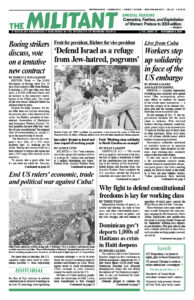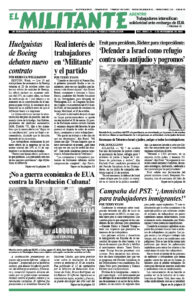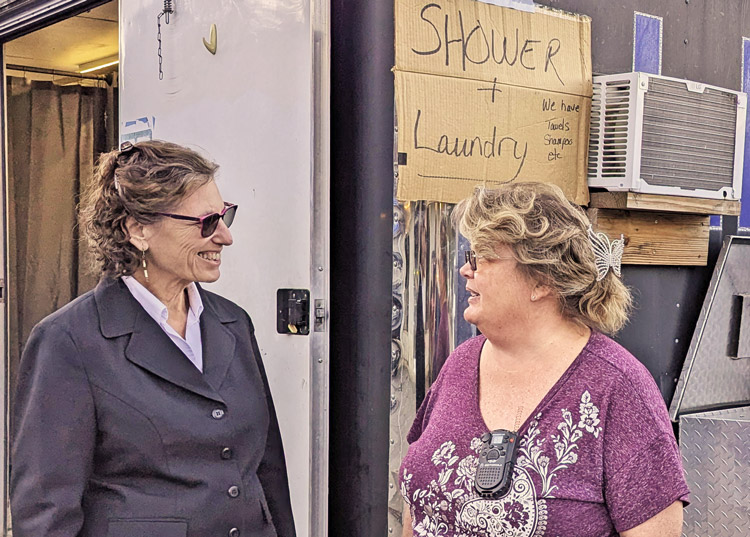ASHEVILLE, N.C. — “We started with no supplies, but within a few days we had to open a warehouse to hold all the contributions that were pouring in for victims of the hurricane,” Isabel Beteta told Rachele Fruit, the Socialist Workers Party candidate for U.S. president, outside the BeLoved Asheville aid center here Oct. 18.
“Hundreds of volunteers have come from all over the country — Pennsylvania, Oklahoma, Kansas and other states, as well as from right here in Asheville” after Hurricane Helene devastated the area, Beteta said.
What Fruit and her campaign supporters saw was the power of working-class solidarity in the face of the indifference of the capitalist rulers and their government.
People in need can come to BeLoved for food, clothing, soap, diapers and many other necessities. Thousands of people in Asheville and nearby lost everything in the flood. Hundreds of houses, mobile homes, small businesses of all kinds, roads and other infrastructure were damaged or swept away. Many of the homes left standing are uninhabitable due to water and other damage.
People have thrown up make-shift distribution centers at gas stations, store fronts or empty lots, where goods are being dropped off and picked up for free. Homemade signs advertise “hot meals here” and “hot showers here.”
Many places still don’t have running water or potable water. Porta-potties are up at post offices, distribution centers and elsewhere.
“I experienced Hurricane Katrina in 2005 as a child in New Orleans,” Beteta told Fruit. “I have friends who are still living in FEMA housing there, nearly 20 years later. What will happen here?”
“An experience like this can affect people for a lifetime,” Fruit said. “What a contrast to Cuba. Although they have far fewer resources, the Cuban government’s starting point is that no one is left on their own when a disaster like this happens.
“Solidarity is everything,” Fruit said. “The army and popular organizations in Cuba are mobilized in advance to evacuate people and their pets, and when the storm has passed, everyone works together to help rebuild.
“This is only possible because working people took power in 1959 and made a socialist revolution. Here, in the richest capitalist country in the world, working people also try to help each other,” Fruit added. “But most of those in need are left on their own, trying to get a little bit of help from indifferent and inadequate government agencies.” Beteta took pictures of Fruit’s campaign literature to read later.
Fruit also spoke to several immigrant workers from Mexico who were picking up supplies from bins set out in the parking lot. One woman told Fruit she had lost her job and her house. Another said a tree fell on her house, but she’s still living there. It can cost thousands of dollars to remove a downed tree.
The workers took Fruit’s Spanish-language campaign leaflets and wished her well.
Fruit visited the Asheville area with a campaign team that included Jose Alvarado, a retired rail worker who lives in nearby Otto.
“People who need housing are being given vouchers to stay in motels that are 50 miles or farther away,” Alvarado told the Militant. “But some people don’t want to go so far from their homes and their families, and are staying in tents near where they lived.”
Asheville, a city of 93,000, is surrounded by the Blue Ridge Mountains of western North Carolina. The levels of rain that washed down from the higher elevation mountains surrounding the city compounded flooding from the areas’ rivers and reservoirs, the worst in hundreds of years in some places.
Fruit visited Black Mountain, east of Asheville. It’s on the Swannanoa River, which, along with the French Broad and other rivers in the area, burst their banks, leaving massive amounts of mud and debris behind.
The SWP candidate stopped at The Railyard, a music venue that has become a donation drop-off site and one of many places in the area where people can get much-needed free meals and supplies. Musicians perform for free for those stopping by.
“We’ve been so moved by the support we’ve gotten from the community,” Hannah Louw, an information technology worker told Fruit. “I evacuated to Winston-Salem before the storm and just came back last week. My house was damaged, but I can stay there now. Most insurance doesn’t cover flood damage.
“The way people are helping each other is part of the Appalachian spirit,” Louw said. “It would be good if things could stay this way, even after we’ve rebuilt.”
“I’ve been campaigning around the country, bringing solidarity to union picket lines wherever I can,” Fruit told Louw. “One of the most important questions I raise is the need for workers to form a party of labor, based on the unions and break from the capitalist parties.
“I’ve also been talking to workers about the need for the unions to fight against Jew-hatred and defend Israel’s right to exist as an unconditional refuge for the Jews,” Fruit said.
“I agree,” said Louw, who is originally from South Africa. She told Fruit she was opposed to the South African government’s attempt to blame Israel for the deaths in Gaza since Hamas’ Oct. 7 pogrom.
In Swannanoa, another hard-hit community, Fruit met many volunteers, including two young men covered in mud who told her it was their first day helping out some neighbors whose house was still standing. At first they were surprised that the SWP presidential candidate wanted to meet them, but they took time to talk to her for a few minutes.
Across the parking lot was a trailer outfitted with two hot showers and a washer/dryer set up. Residents and volunteers can come anytime to wash up and have their laundry done.
“I’ve been here a week,” said Polly Augenstein, who was staffing the trailer. “The laundry runs day and night. My son has a bulldozer and when we saw that heavy equipment was needed to help dig out the whole area, my husband and I and our son decided to come down. We contacted the Cajun Navy and they told us what to do.” Her husband and son run the bulldozer, while Polly takes care of the mobile laundry. They sleep in their RV at night.
Fruit met Kyrie Hutchinson and her two daughters, who drove down from Laconia, New Hampshire, to bring supplies and donations, including gift cards.
“My neighbors and customers from my cleaning business donated all kinds of things that they hoped people could use,” Hutchinson said. “Everything was in excellent condition. We tried to contribute what we brought to the Red Cross center, but they said they wouldn’t take anything unless it was brand new.”
Hutchinson and her daughters took campaign literature and signed up for a Militant subscription, to follow Fruit’s campaign when they get home.
“The tremendous mobilization of volunteers, mostly working people, in response to this disaster shows the ability of the working class to organize society,” Fruit told the Militant after the visit. “But to unleash the powerful potential force of organized solidarity to take on challenges like this, the working class has to take political power into its own hands.”
Mary Martin contributed to this article.



